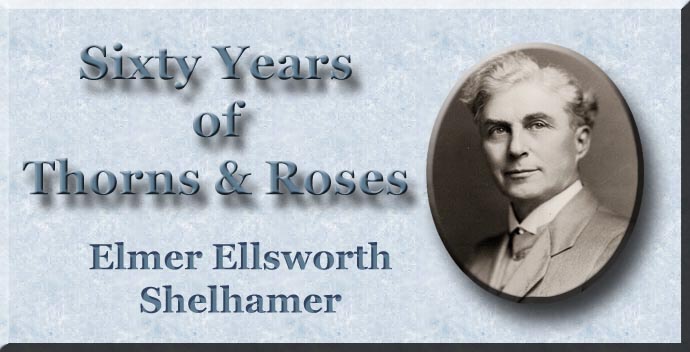
60 Years of Thorns & Roses
By Elmer Ellsworth Shelhamer
Part II
Chapter 41
TOO SECLUDED AND UNSOCIABLE
After I got a real sight of carnality and its subtle workings, then the mighty deliverance that came after six days of dying out (the disciples were at it ten days), I began to think that very few professors, including the ministry, knew what it was to pass through that deep, inward crucifixion to the self life. It seemed my eyes were so enlightened and my spirit so susceptible that now I could discern the outcroppings of the cold man" where formerly I did not think he existed. In my efforts to undeceive others I fell into a grievous fault myself, becoming denunciatory and driving in my manner of preaching. I dwelt more upon the crucifixion agony than upon the resurrection glory. It put them to seeking (which doubtless was necessary), but did not proportionately stimulate hope and faith. My brethren became afraid of me, for they said that I did not have confidence in their experiences. The reason I could not have full confidence in some brethren was that their jesting, joking remarks, and sometimes undue freeness and familiarity toward those of the opposite sex, seemed so horrible that in spirit I ceased to fellowship them. They felt it keenly and said they could not get near me. While at Stone Mountain, Ga., in a meeting, one morning wife and I ascended the mountain and there spent the day in fasting and prayer. God in mercy flooded my soul with a special melting. He revealed to me the possibility of keeping so bathed in holy oil that instead of holding compromising brethren off at arm's length lest I partake of their ways, I could draw up close to them and, if need be, let them pour upon me all of their views, and nothing would stick because of the anointing. More than this, the only way to stab a man under the fifth rib is to get up close to him. To me this was a valuable lesson. It taught me that like the tugboats in the filthy Chicago river, we could plow through the contaminating things of this old world and nothing would stick to us. Yea, the obstacles themselves, instead of hindering, so far polish us that sooner or later we will see that they were just the things we needed. |
|
 |
 |
|
|
|
-
Site Navigation
 Home
Home What's New
What's New Bible
Bible Photos
Photos Hiking
Hiking E-Books
E-Books Genealogy
Genealogy Profile
Free Plug-ins You May Need
Profile
Free Plug-ins You May Need
 Get Java
Get Java.png) Get Flash
Get Flash Get 7-Zip
Get 7-Zip Get Acrobat Reader
Get Acrobat Reader Get TheWORD
Get TheWORD